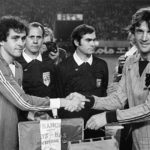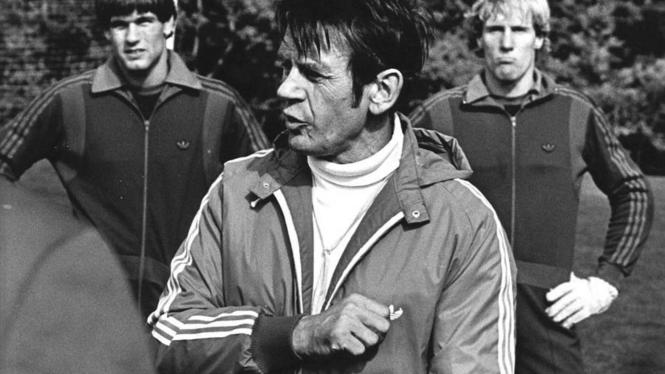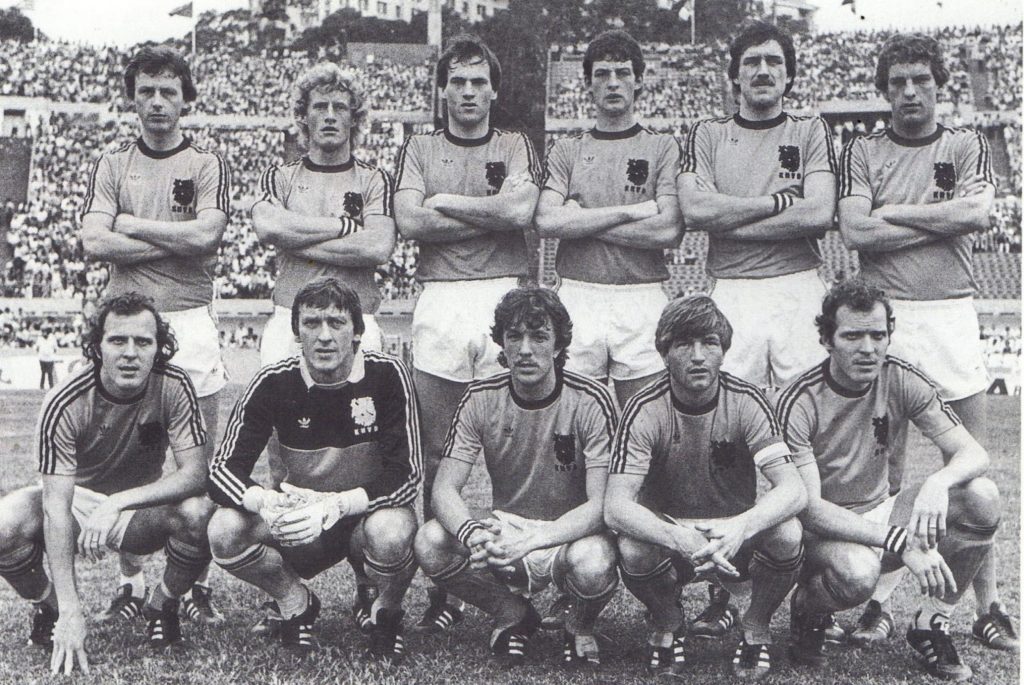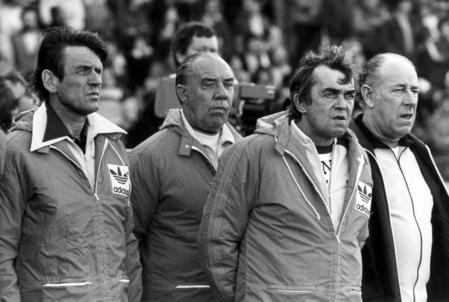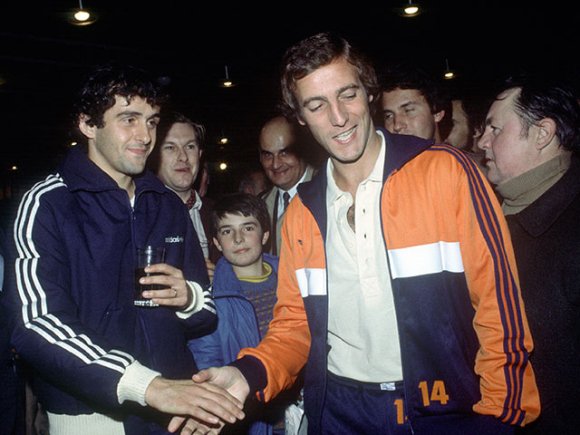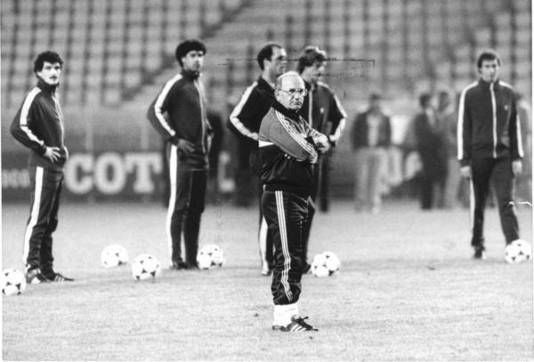The last World Cup we had to miss was the 2002 one in Japan/South Korea. Mr Van Gaal is probably extremely motivated this time around to atone for his sins. That World Cup, I hardly watched a game. I simply couldn’t be bothered. I did follow Hiddink with South Korea, but that was it.
How different was it with the 1982 World Cup. In my view, still one of the best World Cups (after the 1974 one, but definitely before the 1978 and 2010 ones…). What was not to like? Scotland. Brazil. Yugoslavia. France. Spain. Argentina. And Italy, of course.
But after two lost finals (and two dramatic Euro campaigns in 1976 and 1980) Holland was not present at the World Cup.
A lot of people claim that Holland lacked quality to qualify. As in, not enough talent.
I do not agree. I think Holland always had enough talent to qualify any tournament (also the 1984/1986 tournaments and surely the 2002 World Cup).
Team manager Jan Zwartkruis with goalie Joop Hiele and Jan Boskamp
But at the time, our Oranje was not as popular (amongst players and clubs) as it is today. And the KNVB was definitely a more amateuristic federation. For the 1974 and 1978 World Cups, the KNVB had two world class coaches for the big tournaments (Michels and Happel) but the qualifications were done by “KNVB stall wards”. KNVB coaches, who worked according to the “rules”. Icons like Cruyff and Van Hanegem would get in trouble with these “rules” later on in their careers, when they pursued a coaching future.
Remember, all this was right after the period in which players were not properly insured when playing for Oranje. Or not even properly compensated. THe time in which Cruyff’s personal sponsor contract (with his own sports fashion brand) collided with the overall KNVB sponsor contract. The JC two stripes vs the Adidas three stripes, etc etc.
A time in which there was no real Dutch football culture yet. Sure, Total Football had dominated the 1974 tournament, but the football culture would become a topic as such (for the KNVB, clubs, media etc) when Michels led Oranje to victory in 1988. The barren period between 1978 and 1988 is testament to that.
The KNVB did not employ a good team manager for the Dutch team like they have done in recent decades. We did not have coaches with established careers like Hiddink, Van Marwijk or Van Gaal in charge. But “company men” like Fardronc and Zwartkruis.
The Mundialito team: Standing from left to right: Hugo Hovenkamp (AZ), Kees Kist (AZ), Martin Jol (FC Twente), Ernie Brands (PSV), Ronald Spelbos (AZ) and Pierre Vermeulen (Feyenoord), seated: Rene van de Kerkhof (PSV), Pim Doesburg (PSV), Ben Wijnstekers (Feyenoord), Jan Peters (AZ) and Willy van der Kuylen (PSV).
With all due respect to them (and the players did have enormous sympathy for these coaches), it was not what the players needed. In those days, football players were like outlaws. Like rebels. They didn’t care about nutrition. They hated training (as it was merely running in those days anyway), they smoked, they partied hard and tactically, they were unskilled and undisciplined. It was not a coincidence that tough coaches like Happel, Michels, Weisweiler, Menotti, Herrera, Schon were successful. Players needed a strict ruler in those days.
I believe there was still that belief in Holland that after Cruyff and Van Hanegem, it was all over again. We used to be a small football nation and after that “wonder-generation” it would be over. Once these guys (and Krol, Jansen, Rensenbrink) would retire, Holland would go back to being small. And every decision, every step, every though reflected this inferiority belief.
The 1980 dressing down in the Italian EC further “proved” that point. We were not going to ever be able to perform well at a World Cup.
Strangely enough, the Dutch teams didn’t do too shabby in those days. AZ’67 had a very strong period in those days, with pretty good football too. It was very much 4-4-2 (a style which collided with the 4-3-3 of Oranje and played by Ajax and Feyenoord) but players like John Metgod, Ron Spelbos, Hugo Hovenkamp, Jan Peters, Pier Tol and Kees Kist surely should have been able to lift Oranje’s level.
Frans Thijsen and Arnold Muhren made headlines in the UK with Ipswich Town and Ajax, PSV and Feyenoord did produce enough quality for Oranje to qualify for a big tournament.
But Oranje need a tactical and psychological heavyweight to foster and develop all this talent into a well oiled machine. And I believe (again: with due respect) that the circumstances offered up by the KNVB were ideal.
Jan Zwartkruis as assistant to Ernst Happel (second from right): not much love lost between these two….
Jan Zwartkruis was the team manager. I don’t want to say anything bad about him as I believe he was a very good assistant coach. He oozed football. He was a pro player in the 1950s (and played with Marco van Basten’s father, Joop) and had all sorts of jobs in amateur football. He started as keeper coach and moved his way up via all sorts of amateur clubs. In 1962, he started to work for the KNVB, as assistant to Elek Schwartz. One of his own teams was the Military Team, which at the time was one of the breeding grounds for talent. Players like Jan Mulder, Rob Rensenbrink and the Van de Kerkhof twins. Fourteen years later, after the abysmal European tournament in 1976, he was asked to be care taker manager for Oranje for two games. That deal was extended with another two games, but as Zwartkruis refused to give up his job with the Ministry of Defence, the KNVB appointed a team manager above him: Ernst Happel. Zwartkruis would go back in assistant role. To give some colour regarding his work and his relationship with the players, there is a funny anecdote about Zwartkruis practicing with the goalies. He is warming up Jongbloed, while the media is watching. Zwartkruis hit 4 balls in a row over the goal. Prompting Jan Jongbloed to yell: “How about one shot on target maybe, Jan?”.
Michel Platini and Johan Neeskens
After the 1978 World Cup, Zwartkruis got end responsibility over Oranje. In his biography, years after the event, he told about his battles and clashes with Happel, whom he called a brute. The passionate and animated Zwartkruis had a bad relationship with the Austrian tactician and found him closed off, cynical, headstrong and anti-social.
Zwartkruis was in charge of Oranje at the Mundialito in 1980/81 in Uruguay. A FIFA Celebration tournament, celebrating the 50est birthday of the World Cup. The 6 winners were invited to compete (Uruguay, England, West Germany, Italy, Argentina, Brazil) but when England declined, two time runners up Holland was invited.
Zwartkruis needed to further renovate the Oranje team. The 1980 squad was already quite different to the 1978World Cup one and in at the start of 1981, it was AZ delivering the skeleton for the Oranje squad.
Here we see Holland draw against Italy, with a good early goal from Madrid coach Ancelotti and the equaliser of AZ playmaker Jan Peters.
Argentina was making a shift from the 1978 Mario Kempes lead team to a squad with a young Diego Maradona (he scored that tournament) and Ramon Diaz.
Italy would win the World Cup 1982 and the Mundialito squad already had names like Marco Tardelli, Cabrini, Scirea, Ancelotti, Bruno Conti and Giancarlo Antognioni.
The Netherlands squad had the best players of that generation, but as stated before, it was the AZ faction that was in form and had the confidence but their style of play didn’t really fit the style of play of the Ajax/Feyenoord contingent.
Holland did seem to have more and maybe better talent (like Tscheu La Ling and Rene van der Gijp) but somehow Jan Zwartkruis didn’t like players with too much of an own mind. Ruud Geels was Holland’s top scorer but didn’t get a starting berth while Wim Kieft was already broken through at Ajax but was deemed too young, just like defender/midfielder Frank Rijkaard. Wim Jansen and Johan Cruyff made Ajax champions in the season after but Zwartkruis ignored them for being too old. Rumour has it that Zwartkruis indeed toyed with the idea of selecting JC, but the iconic number 14 was quite clear in his statements: no more Oranje.
The rest of the world felt that Holland had it. With players like Neeskens, Van Hanegem and in particular Cruyff no longer part of the squad, the Belgium and France coaches were buoyant. “This Holland has lost its best players. We are confident we can get a result against them now.” The only Golden Generation players left were Ruud Krol, Johnny Rep and the Van de Kerkhof twins.
Holland didn’t do too well in Uruguay and the World Cup qualifications was not a smooth ride either. Zwartkruis did seem to select the best player of that era (Wijnstekers, Spelbos, Hovenkamp….tough defenders… Michel Valke, Jan Peters, Jan van Deinsen…good midfielders… Pier Tol, Pierre Vermeulen, Rene van de Kerkhof, Simon Tahamata, …powerful forwards… But Zwartkruis couldn’t get them to play well together, as a unit. The automatisms, the flowing play… it seemed lost.
Kees Rijvers in charge, with a young Frank Rijkaard at the back
The coach was replaced during the qualification period and seasoned success coach Kees Rijvers (ex-international and ex-coach of FC Twente and PSV) was brought in to reach the World Cup.
So we were in a group with Cyprus, Ireland, France and Belgium. Belgium in those days was a fierce opponents, as was France (not unlike today) and Ireland was an outsider, who could make it hard for you. Cyprus was the opponent against which the goal difference was taken into account. Winning wasn’t enough: goals were needed!
Zwartkruis used a younger generation of pretty gifted players, from Ajax and Feyenoord but also using a number of players from new powerhouse AZ-67. A number of cool headed strikers like Nanninga, Schapendonk and Van Kooten were added to the mix as well.
In the first qualifier, away against the Republic of Ireland, Ajax winger Simon Tahamata scores the opener after a powerful run by right winger Toine van Mierlo (Willem2). But led by Liam Brady, the Oirish came back into the game, setting up two goals: 1-2.
Our second qualifier was away against Belgium, and we lost that as well. Lost the ball in defence in the build up, Vander Eycken picks the ball up and drives into the box, he gets tackled unfairly and the ref gives the penalty.
Two games lost and the players don’t feel it with him anymore. Rijvers comes back in and the coach falls back on some old hands, Neeskens, Rep and Arnold Muhren, to give the team some more experience and grit.
The first home game was played in Groningen, versus Cyprus. AZ left full back Hugo Hovenkamp scored the first, with MVV striker Cees Schapendonk scored the second with Roda JC striker Dick Nanninga (of WC1978 finals fame) scoring the third: 3-0.
Next game was France at home. The France of Giresse, Didier Six, Rocheteau, Bossis vs the Oranje of Arnold Muhren, John Rep, Hugo Hovenkamp, Piet Schrijvers and Ruud Krol. A sensational free kick of Muhren finished this game to 0-1.
Ireland came visiting, a must win game for Holland. Frans Thijssen scored the 1-0 but Ireland drew 1-1 before half time. In the second half, a penalty for Holland, converted by Arnold Muhren. He never misses. 2-1 up but Ireland came back into the game, via a Frank Stapleton (ex Ajax) goal.
Holland needed to win the away game against France. Van Breukelen made his way into the team and when Michel Platini was awarded a free kick outside of the box, Ruud Krol at the last second decided to move to the post which De Breuk left open for Platini to go for. Allowing the goalie to focus on his left only. Platini hit it sweetly and despite Krol on the goal line, the French #10 scored. Van Breukelen would later say that Krol’s last second dash into the goal distracted him. See for yourself. The slow mo replay shows how Hans got his footwork wrong, but making a split step while the ball was already traveling half way. He was too slow to get to the corner as a result. Didier Six scored the 2-0 and Holland would not be going to the Spain WC in 1982. Belgium finished first and France and Ireland tied at 10 points at second spot, with France having a slightly better goal difference.
This dreadful World Cup campaign shocked the world, as one of the favorites would not be at the tournament and players like Neeskens, Rep and Ruud Krol basically ended their World Cup careers…

